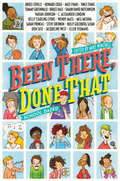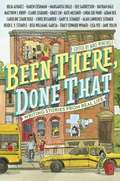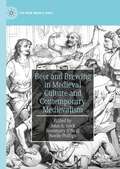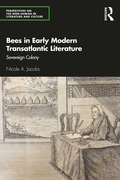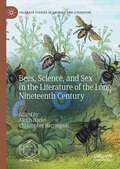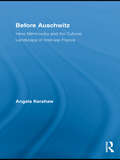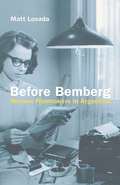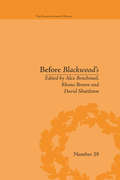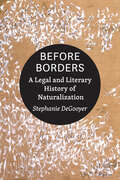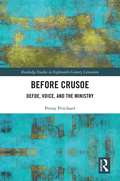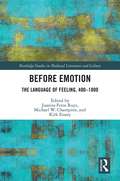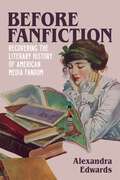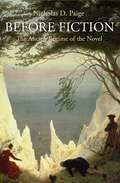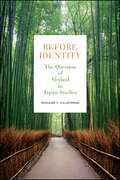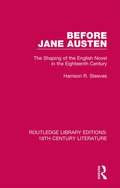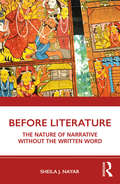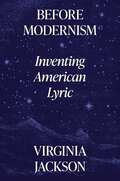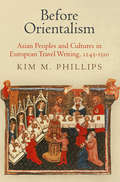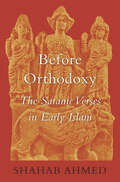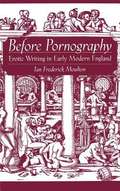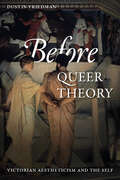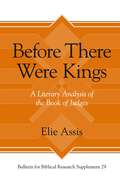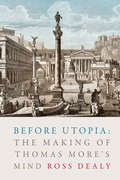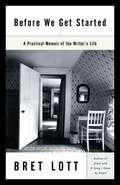- Table View
- List View
Been There, Done That: School Dazed
by Mike Winchell Eglantine CeulemansSchool is in session as celebrated authors share their real-life academic experiences and turn them into fiction!To some kids, school means homework, bus rides, or band practice. To others it means bullies, tough teachers, or pranking the substitute. In this second collection in the Been There, Done That series, authors describe a standout story from their school days. As with the first anthology, each author will contribute a narrative nonfiction account that serves as the inspiration for an original fictional short story. The contributing award-winning and best-selling middle-grade authors include Holly Goldberg Sloan, Kelly Starling Lyons, Tommy Greenwald, Wendy Mass, Bruce Hale, Jacqueline West, Ellen Yeomans, Vince Evans, Nate Evans, Sarah Prineas, Steve Sheinkin, Shaun David Hutchinson, Don Tate, Varian Johnson, Howard Cruse, Meg Medina, C. Alexander London, and Bruce Coville.From the Hardcover edition.
Been There, Done That: Writing Stories from Real Life
by Mike Winchell Eglantine CeulemansWhere do authors get their ideas? And how do they turn those ideas into stories? This anthology looks at the process of taking real-life experiences and turning them into works of engaging fiction. The collection features award-winning and bestselling middle-grade authors who provide both original fictional short stories as well as the nonfiction accounts that inspired them. The contributing authors include Julia Alvarez, Karen Cushman, Margarita Engle, Dee Garretson, Nathan Hale, Matthew Kirby, Claire Legrand, Grace Lin, Kate Messner, Linda Sue Park, Adam Rex, Gary Schmidt, Alan Sitomer, Caroline Starr Rose, Heidi Stemple, Rita Williams-Garcia, Tracy Edward Wymer, Lisa Yee, and Jane Yolen.
Beer and Brewing in Medieval Culture and Contemporary Medievalism (The New Middle Ages)
by John A. Geck Rosemary O’Neill Noelle PhillipsBeer and Brewing in Medieval Culture and Contemporary Medievalism is a cross-cultural analysis of the role that alcohol consumption played in literature, social and cultural history, and gender roles in the Middle Ages. The volume also seeks to correct or offer new insights into historical beer production. By drawing on the expertise of scholars of history, archaeology, Old and Middle English, Old Norse, and Medieval and Early Modern literature, the book shows how historical medieval beer and brewing has influenced nostalgic post-medieval nationalism and romanticized visions of the medieval ale-house seen in beer marketing today. The essays describe alcohol consumption in the Middle Ages across much of Northern Europe, engage with the various myths employed in modern craft beer advertising and beer production, and examine how gender intersects with beer production and consumption. The editors also raise certain critical questions about medievalisms which need to be interrogated, particularly in light of the continued use of the Middle Ages for white supremacist and colonialist ideals. The volume contributes to the study of the popular and historical understandings of the Middle Ages as well the issues of race and gender.
Bees in Early Modern Transatlantic Literature: Sovereign Colony (Perspectives on the Non-Human in Literature and Culture)
by Nicole A. JacobsThis book examines apian imagery—bees, drones, honey, and the hive—in the seventeenth- and eighteenth-century literary and oral traditions. In England and the New World colonies during a critical period of expansion, the metaphor of this communal society faced unprecedented challenges even as it came to emblematize the process of colonization itself. The beehive connected the labor of those marginalized by race, class, gender, or species to larger considerations of sovereignty. This study examines the works of William Shakespeare; Francis Daniel Pastorius; Hopi, Wyandotte, and Pocasset cultures; John Milton; Hester Pulter; and Bernard Mandeville. Its contribution lies in its exploration of the simultaneously recuperative and destructive narratives that place the bee at the nexus of the human, the animal, and the environment. The book argues that bees play a central representational and physical role in shaping conflicts over hierarchies of the early transatlantic world.
Bees, Science, and Sex in the Literature of the Long Nineteenth Century (Palgrave Studies in Animals and Literature)
by Alexis Harley Christopher HarringtonThe long nineteenth century (1789-1914) has been described as an axial age in the history of both bees and literature. It was the period in which the ecological and agronomic values that are still attributed to bees by modern industrial society were first established, and it was the period in which one bee species (the European honeybee) completed its dispersal to every habitable continent on Earth. At the same time, literature – which would enable, represent and in some cases repress or disavow this radical transformation of bees’ fortunes – was undergoing its own set of transformations. Bees, Science, and Sex in the Literature of the Long Nineteenth Century navigates the various developments that occurred in the scientific study of bees and in beekeeping during this period of remarkable change, focusing on the bees themselves, those with whom they lived, and how old and new ideas about bees found expression in an ever-diversifying range of literary media. Ranging across literary forms and genres, the studies in this volume show the ubiquity of bees in nineteenth-century culture, demonstrate the queer specificity of writing about and with bees, and foreground new avenues for research into an animal profoundly implicated in the political, economic, ecological, emotional and aesthetic conditions of the modern world.
Before Auschwitz: Irène Némirovsky and the Cultural Landscape of Inter-war France (Routledge Studies in Twentieth-Century Literature)
by Angela KershawThis book analyses Irene Némirovsky’s literary production in its relationship to the literary and cultural context of the inter-war period in France. It examines topics of central importance to our understanding of the literary field in France in the period, such as: the close relationship between politics and literature; the historical, political, cultural and personal legacies of the First World War; the so-called ‘crisis of the novel’ and the attempt to create and develop new narrative forms; the phenomenon of Russian emigration to Paris in the wake of the Russian Revolution and Civil War; the possibilities for the creation of a French-Jewish identity and mode of writing; and the threat of fascism and the approach of the Second World War.
Before Bemberg: Women Filmmakers in Argentina
by Matt LosadaBefore Bemberg: Argentine Women Filmmakers calls into question the historiography of Argentine women filmmakers that has centered on María Luisa Bemberg to the exclusion of her predecessors. Its introductory discussion of the abundant initial participation by women in film production in the 1910s is followed by an account of their exclusion from creative roles in the studio cinema, which was only altered by the opportunities opened by a boom in short filmmaking in the 1960s. The book then discusses in depth the six sound features directed by women before 1980, which, despite their trailblazing explorations of the perspectives of female characters, daring denunciations of authoritarianism and censorship, and modernizing formal invention, have been forgotten by Argentine film history. Looking at the work and roles of Eva Landeck, Vlasta Lah, María Herminia Avellaneda and María Elena Walsh and Maria Bemberg, the book recognizes these filmmakers’ contributions at a significant moment in which movements to eliminate gender-based oppression and violence in Argentina and elsewhere are surging. Watch some of the films discussed in the book with English subtitles (https://www.youtube.com/channel/UCF_6F4am5024rklIWwExUVA?view_as=subscriber).
Before Blackwood's: Scottish Journalism in the Age of Enlightenment (The Enlightenment World #29)
by Alex BenchimolThis collection of essays is the result of a major conference focusing specifically on the role of Scotland’s print culture in shaping the literature and politics of the long eighteenth century. In contrast to previous studies, this work treats Blackwood’s Magazine as the culmination of a long tradition rather than a starting point.
Before Borders: A Legal and Literary History of Naturalization
by Stephanie DeGooyerAn ambitious revisionist history of naturalization as a creative mechanism for national expansion.Before borders determined who belonged in a country and who did not, lawyers and judges devised a legal fiction called naturalization to bypass the idea of feudal allegiance and integrate new subjects into their nations. At the same time, writers of prose fiction were attempting to undo centuries of rules about who could—and who could not—be a subject of literature. In Before Borders, Stephanie DeGooyer reconstructs how prose and legal fictions came together in the eighteenth century to dramatically reimagine national belonging through naturalization. The bureaucratic procedure of naturalization today was once a radically fictional way to create new citizens and literary subjects.Through early modern court proceedings, the philosophy of John Locke, and the novels of Daniel Defoe, Laurence Sterne, Maria Edgeworth, and Mary Shelley, DeGooyer follows how naturalization evolved in England against the backdrop of imperial expansion. Political and philosophical proponents of naturalization argued that granting foreigners full political and civil rights would not only attract newcomers but also better attach them to English soil. However, it would take a new literary form—the novel—to fully realize this liberal vision of immigration. Together, these experiments in law and literature laid the groundwork for an alternative vision of subjecthood in England and its territories.Reading eighteenth-century legal and prose fiction, DeGooyer draws attention to an overlooked period of immigration history and compels readers to reconsider the creative potential of naturalization.
Before Crusoe: Defoe, Voice, and the Ministry (Routledge Studies in Eighteenth-Century Literature)
by Penny PritchardPenny Pritchard is a Senior Lecturer in Eighteenth-Century Literature, and has taught at the University of Hertfordshire since completing her PhD in 2006. Both her doctoral thesis (entitled ‘Defoe, Rhetoric, and Nonconformity’) and MA in Eighteenth-Century Studies were undertaken at the University of East Anglia. Her first book (The Long Eighteenth-Century: Literature from 1660 to 1790) was published by York Press in 2010, and she has written extensively on Defoe and early modern religious writing in academic journals and chapter collections.
Before Emotion: The Language Of Feeling 400-1800
by Juanita Feros Ruys Kirk Essary Michael W. ChampionBefore Emotion: The Language of Feeling, 400-1800 advances current interdisciplinary research in the history of emotions through in-depth studies of the European language of emotion from late antiquity to the modern period. Focusing specifically on the premodern cognates of ‘affect’ or ‘affection’ (such as affectus, affectio, affeccioun, etc.), an international team of scholars explores the cultural and intellectual contexts in which emotion was discussed before the term ‘emotion’ itself came into widespread use. By tracing the history of key terms and concepts associated with what we identify as ‘emotions’ today, the volume offers a first-time critical foundation for understanding pre- and early modern emotions discourse, charts continuities and changes across cultures, time periods, genres, and languages, and helps contextualize modern shifts in the understanding of emotions.
Before Fanfiction: Recovering the Literary History of American Media Fandom
by Alexandra EdwardsBefore Fanfiction investigates the overlapping cultures of fandom and American literature from the late 1800s to the mid-1940s, exploding the oft-repeated myth that fandom has its origins in the male-dominated letter columns of science fiction pulp magazines in the 1930s. By reexamining the work of popular American women writers and their fans, Alexandra Edwards recovers the literary history of American media fandom, drawing previously ignored fangirls into the spotlight.
Before Fiction: The Ancien Regime of the Novel
by Nicholas D. PaigeFiction has become nearly synonymous with literature itself, as if Homer and Dante and Pynchon were all engaged in the same basic activity. But one difficulty with this view is simply that a literature trafficking in openly invented characters is a quite recent development. Novelists before the nineteenth century ceaselessly asserted that their novels were true stories, and before that, poets routinely took their basic plots and heroes from the past. We have grown accustomed to thinking of the history of literature and the novel as a progression from the ideal to the real. Yet paradoxically, the modern triumph of realism is also the triumph of a literature that has shed all pretense to literalness.Before Fiction: The Ancien Régime of the Novel offers a new understanding of the early history of the genre in England and France, one in which writers were not slowly discovering a type of fictionality we now take for granted but rather following a distinct set of practices and rationales. Nicholas D. Paige reinterprets Lafayette's La Princesse de Clèves, Rousseau's Julie, ou la Nouvelle Héloïse, Diderot's La Religieuse, and other French texts of the seventeenth and eighteenth centuries in light of the period's preoccupation with literal truth. Paige argues that novels like these occupied a place before fiction, a pseudofactual realm that in no way leads to modern realism. The book provides an alternate way of looking at a familiar history, and in its very idiom and methodology charts a new course for how we should study the novel and think about the evolution of cultural forms.
Before George Eliot
by Fionnuala DillaneFionnuala Dillane revisits the first decade of Marian Evans's working life to explore the influence of the periodical press on her emergence as George Eliot and on her subsequent responses to fame. This interdisciplinary study discusses the significance of Evans's work as a journalist, editor and serial-fiction writer in the periodical press from the late 1840s to the late 1850s and positions this early career against critical responses to Evans's later literary persona, George Eliot. Dillane argues that Evans's association with the nineteenth-century periodical industry, that dominant cultural force of the age, is important for its illumination of Evans's understanding of the formation of reading audiences, the development of literary genres and the cultivation of literary celebrity.
Before Identity: The Question of Method in Japan Studies
by Richard F. CalichmanBefore Identity represents the first attempt to provide a comprehensive examination of the methodological ground of Japan studies. At its most basic level, the field presupposes the immediate empirical existence of an entity known as the "Japanese people" or "Japanese culture," from which it then carves out its various objects of inquiry. Richard F. Calichman attempts to show that this presupposition is itself ineluctably bound up with modern forms of knowledge formation, thereby enlarging the scope of what is meant by modernity. In this way, he aims to bring about a heightened level of theoretical-critical vigilance in the field.Calichman explores the methodological commitments implied or expressed in the work of a range of writers and scholars—Murakami Haruki, Komori Yōichi, Harry Harootunian, Tomi Suzuki, Alan Tansman, and Dennis Washburn—and how such commitments have shaped and limited the field. If theoretical issues in Japan studies are not subjected to this sort of in-depth scrutiny, Calichman argues, then the field will continue to remain ghettoized relative to other disciplines in the humanities and social sciences, which have typically been more receptive to conceptual discourse. By showing that scholarly inquiry must begin not at the level of the object but rather at the more fundamental level of methodology, Calichman aims to introduce a greater degree of theoretical rigor to the discipline of Japan studies as a whole.
Before Jane Austen: The Shaping of the English Novel in the Eighteenth Century (Routledge Library Editions: 18th Century Literature)
by Harrison R. SteevesFew centuries have seen greater changes in social perspective and guiding ideas than the eighteenth century; literature in every Western country was a powerful instrument not only in recording these changes but in bringing them about. In England, the rise and development of a new literary form – the novel – graphically mirrors that great transition in social ideology, often with rare entertainment. Originally published in 1965, in the words of Professor Steeves: ‘This volume is to deal with the years in which the novel was still an experiment. At the beginning of the eighteenth century there was no novel. By the end, novels of every description were being published, not in dozens, but in hundreds. The badness of the product was universally recognized, but perhaps fifty had emerged out of the ruck of mediocrity, some tolerable, some good, and some great.’ The author tells us that it is the province of the novel ‘to deal with what seems to be real people, in situations which have the tang of the life of the time and which pose significant problems related to that life.’ He examines the changing view of the social scene in the works of the great novelists of the period – Defoe, Richardson, Fielding, Smollett, and Sterne – and in the less familiar but still significant novels of others from the time. The discussion ends with Austen because she comes ‘exactly at the end of a century highly important in intellectual and cultural history, and at the beginning of another century equally epoch-making…. Miss Austen can properly be called the first modern English novelist, the earliest to be read with the feeling that she depicts our life, and not a life placed back somewhere in history, or off somewhere in imagined space’.
Before Literature: The Nature of Narrative Without the Written Word
by Sheila J. NayarBefore Literature examines storytelling that, whether due to historical, technological, or socio-economic circumstance, is neither shaped nor influenced by alphabetic literacy. How does a story unfold when carried solely in memory, when it cannot be written down or externally stored? What structural and stylistic pressures are imposed when it must travel through space and time exclusively by word of mouth? In Before Literature, Sheila J. Nayar addresses these very questions, guiding the reader in a lively and accessible manner through the key features of storytelling that's been unaffected by writing. Even more, Nayar shows how the very norms that drove oral epics such as the Mahabharata and Homer’s Odyssey can continue to shape contemporary forms like Bollywood masala films, Hollywood spectaculars, and comic books. This clear and accessible guide is an ideal starting point for undergraduates approaching the study of orality. It offers a fundamentally different way of thinking about oral narrative, while also disclosing some of the "hows" and "whys" of written literature, leading to a much broader understanding and appreciation of our storytelling tradition.
Before Modernism: Inventing American Lyric
by Virginia JacksonHow Black poets have charted the direction of American poetics for the past two centuriesBefore Modernism examines how Black poetics, in antagonism with White poetics in the late eighteenth and early nineteenth centuries, produced the conditions for the invention of modern American poetry. Through inspired readings of the poetry of Phillis Wheatley Peters, George Moses Horton, Ann Plato, James Monroe Whitfield, and Frances Ellen Watkins Harper—as well as the poetry of neglected but once popular White poets William Cullen Bryant and Henry Wadsworth Longfellow—Virginia Jackson demonstrates how Black poets inspired the direction that American poetics has taken for the past two centuries. As an idea of poetry based on genres of poems such as ballads, elegies, odes, hymns, drinking songs, and epistles gave way to an idea of poetry based on genres of people—Black, White, male, female, Indigenous—almost all poetry became lyric poetry. Jackson traces the twisted paths leading to our current understanding of lyric, along the way presenting not only a new history but a new theory of American poetry.A major reassessment of the origins and development of American poetics, Before Modernism argues against a literary critical narrative that links American modernism directly to British or European Romanticism, emphasizing instead the many ways in which early Black poets intervened by inventing what Wheatley called “the deep design” of American lyric.
Before Orientalism
by Kim M. PhillipsA distinct European perspective on Asia emerged in the late Middle Ages. Early reports of a homogeneous "India" of marvels and monsters gave way to accounts written by medieval travelers that indulged readers' curiosity about far-flung landscapes and cultures without exhibiting the attitudes evident in the later writings of aspiring imperialists. Mining the accounts of more than twenty Europeans who made--or claimed to have made--journeys to Mongolia, China, India, Sri Lanka, and Southeast Asia between the mid-thirteenth and early sixteenth centuries, Kim Phillips reconstructs a medieval European vision of Asia that was by turns critical, neutral, and admiring.In offering a cultural history of the encounter between medieval Latin Christians and the distant East, Before Orientalism reveals how Europeans' prevailing preoccupations with food and eating habits, gender roles, sexualities, civility, and the foreign body helped shape their perceptions of Asian peoples and societies. Phillips gives particular attention to the texts' known or likely audiences, the cultural settings within which they found a foothold, and the broader impact of their descriptions, while also considering the motivations of their writers. She reveals in rich detail responses from European travelers that ranged from pragmatism to wonder. Fear of military might, admiration for high standards of civic life and court culture, and even delight in foreign magnificence rarely assumed the kind of secular Eurocentric superiority that would later characterize Orientalism. Placing medieval writing on the East in the context of an emergent "Europe" whose explorers sought to learn more than to rule, Before Orientalism complicates our understanding of medieval attitudes toward the foreign.
Before Orthodoxy: The Satanic Verses in Early Islam
by Shahab Ahmed“The most systematic, critical study of an especially important tradition from early Islamic history, the so-called incident of the Satanic verses.” —ChoiceOne of the most controversial episodes in the life of the Prophet Muhammad concerns an incident in which he allegedly mistook words suggested by Satan as divine revelation. Known as the Satanic verses, these praises to the pagan deities contradict the Islamic belief that Allah is one and absolute. Muslims today?of all sects?deny that the incident of the Satanic verses took place. But as Shahab Ahmed explains, Muslims did not always hold this view.Before Orthodoxy wrestles with the question of how religions establish truth?especially religions such as Islam that lack a centralized authority to codify beliefs. Taking the now universally rejected incident of the Satanic verses as a case study in the formation of Islamic orthodoxy, Ahmed shows that early Muslims, circa 632 to 800 CE, held the exact opposite belief. For them, the Satanic verses were an established fact in the history of the Prophet. Ahmed offers a detailed account of the attitudes of Muslims to the Satanic verses in the first two centuries of Islam and traces the chains of transmission in the historical reports known as riwayah.Touching directly on the nature of Muhammad’s prophetic visions, the interpretation of the Satanic verses incident is a question of profound importance in Islam, one that plays a role in defining the limits of what Muslims may legitimately say and do?issues crucial to understanding the contemporary Islamic world.
Before Pornography: Erotic Writing In Early Modern England (Studies In The History Of Sexuality)
by Ian Frederick MoultonBefore Pornography explores the relationship between erotic writing, masculinity, and national identity in Renaissance England. Drawing on both manuscripts and printed texts, and incorporating insights from modern feminist theory and queer studies, the book argues that pornography is a historical phenomenon: while the representation of sexual activity exists in nearly all cultures, pornography does not. The book includes analyses of the social significance of eroticism in such canonical texts as Sidney's Defense of Poesy and Spenser's Faerie Queene.
Before Queer Theory: Victorian Aestheticism and the Self
by Dustin FriedmanA reimagining of how the aesthetic movement of the Victorian era ushered in modern queer theory.Late Victorian aesthetes were dedicated to the belief that an artwork's value derived solely from its beauty, rather than any moral or utilitarian purpose. Works by these queer artists have rarely been taken seriously as contributions to the theories of sexuality or aesthetics. But in Before Queer Theory, Dustin Friedman argues that aestheticism deploys its "art for art's sake" rhetoric to establish a nascent sense of sexual identity and community.Friedman makes the case for a claim rarely articulated in either Victorian or modern culture: that intellectually, creatively, and ethically, being queer can be an advantage not in spite but because of social hostility toward nonnormative desires. Showing how aesthetes—among them Walter Pater, Oscar Wilde, Vernon Lee, and Michael Field—harnessed the force that Georg Wilhelm Friedrich Hegel called "the negative," Friedman reveals how becoming self-aware of one's sexuality through art can be both liberating and affirming of humanity's capacity for subjective autonomy.Challenging one of the central precepts of modern queer theory—the notion that the heroic subject of Enlightenment thought is merely an effect of discourse and power—Friedman develops a new framework for understanding the relationship between desire and self-determination. He also articulates an innovative, queer notion of subjective autonomy that encourages reflecting critically on one's historical moment and envisioning new modes of seeing, thinking, and living that expand the boundaries of social and intellectual structures. Before Queer Theory is an audacious reimagining that will appeal to scholars with interests in Victorian studies, queer theory, gender and sexuality studies, and art history.
Before There Were Kings: A Literary Analysis of the Book of Judges (Bulletin for Biblical Research Supplement)
by Elie AssisFollowing the great periods of national leadership by Moses and Joshua, the book of Judges depicts the stewardship of various judges that rose to power to solve local religious and military challenges in the premonarchic period. This volume provides a close reading of the entire book of Judges, taking seriously the distinct elements of the book and how they are interconnected.Elie Assis explores the ways in which the ideology and theology of Judges unfold through a careful literary analysis. Moving beyond the cycle of sin, punishment, and salvation, Assis demonstrates how differences in the descriptive language applied to each judge, as well as the evaluations in the opening and concluding chapters, provide clues as to the organization and message of the text. Most works on Judges focus on the historical background of the period or the historical process of the book’s composition and seek to dissolve its stories into component parts. In contrast, Before There Were Kings points to the deep underlying unity of Judges and the function of the individual stories within the whole.New and carefully drawn insights related to the purpose of each section and the themes that shape the book as a whole make this a groundbreaking, programmatic contribution to research on the book of Judges. It will be of particular interest to students and scholars of the Old Testament and the Hebrew Bible.
Before Utopia: The Making of Thomas More’s Mind
by Ross DealyBefore Utopia demonstrates that Thomas More’s Utopia (1516) is not, as is widely accepted, a rhetorical play of spirit but is instead built from a particular philosophy. That philosophy was not Platonism, but classical Stoicism. Deeply disturbed in his youth by the conviction that he needed to decide between a worldly and a monastic path, Thomas More’s outlook was transformed in 1504 by Erasmus’ De taedio Iesu and Enchiridion. As a consequence, he married in 1505 and wholeheartedly committed himself to worldly affairs. His Lucian (1506), written after working directly with Erasmus, adopts the Stoic mindset; Erasmus’ Praise of Folly (1511) shows from beginning to end the workings of More’s life-changing Stoic outlook. More’s Utopia then goes on to systematically illustrate the Stoic unitary two-dimensional frame of thought within an imaginary New World setting. Before Utopia is not just a book about Thomas More. It is a book about intellectual history and the movement of ideas from the ancient world to the Renaissance. Ross Dealy emphasizes the continuity between Erasmus and More in their religious and philosophical thought, and above all the decisive influence of Erasmus on More.
Before We Get Started: A Practical Memoir of the Writer's Life
by Bret LottThis marvelous guide begins where other books on writing and the writing life leave off. Delving deep into the creative process, Bret Lott reveals truths we scarcely realized we needed to know but without which we as writers will soon lose our way. In ten intimate essays based on his own experiences and on the seasoned wisdom of writers including Eudora Welty, E. B. White, Henry David Thoreau, Henry James, and John Gardner, Lott explores such topics as * why write? why keep writing? * the importance of simple words * the finer points of character detail * narrative and the passage of time * the pitfalls of technique * making a plan--and letting it go * risking failure--and reaping the benefits * Accepting rejection. Writers travel alone, but Bret Lott's book makes the journey less lonely and infinitely more rewarding. Before We Get Started will help you make your work as good as it can be: "Pay attention recklessly. Strain to see through the window of your own artistic consciousness in the exhilarating knowledge that there is no path to the waterfall, and there are a million paths to the waterfall, and there is, too, only one path: yours."
